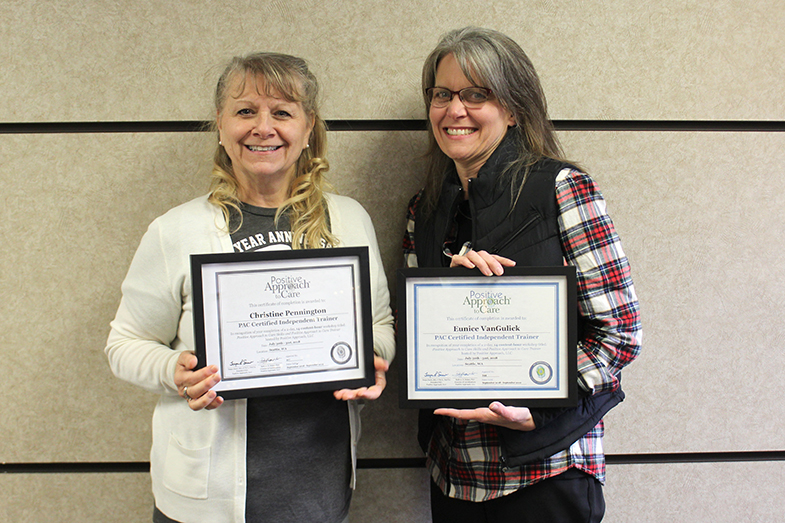BRMC Staff Members Earn Dementia Training Certification, Offer Workshops
- Category: News
- Posted On:
- Written By: Baxter Regional Medical Center

Two Baxter Regional Medical Center staff members recently became Certified Independent Trainers of Teepa Snow's Positive Approach® to Care. Christine Pennington, BSN, RN, Clinical Nurse, 4 South Stepdown, and E. Diahanne VanGulick, Coordinator of the Mruk Family Education Center on Aging, recently completed the certification course to train others in the Positive Approach® to Care (PAC) philosophy, providing dementia related awareness, knowledge, and skill development in a classroom, community, or support group setting.
 PAC Certified Independent Trainers Christy Pennington and Diahanne VanGulick
PAC Certified Independent Trainers Christy Pennington and Diahanne VanGulick
Christy and Diahanne said they are very excited to bring this awareness and knowledge to healthcare professionals at Baxter Regional and in our community. Incorporating the philosophy will help to improve the patient experience for dementia patients, their families, and their healthcare teams as well as make a difference in daily management for family care partners in the home. The first step of the newly certified trainers is to roll out the Dementia Carepartner Workshop Series for professional and family dementia caregivers beginning this month. Healthcare professionals and family carepartners are invited to attend these free sessions, but registration is required, as space is limited. Please call the Mruk Family Education Center on Aging at (870) 508-3880 to register or for more information.
Workshop A: Normal Aging/Not Normal Aging
Part one: Tuesday, January 22, 1:30 - 2:30 p.m.
Part two: Tuesday, January 29, 1:30 - 2:30 p.m.
This 2 part workshop helps learners understand and recognize the differences in “normal” and “not normal” aging. The workshop emphasizes the value of matching helping behaviors to the person’s needs and retained abilities to promote a sense of control and self-direction, and addresses typical issues that occurs throughout the progression of dementia.
Objectives:
- Compare and contrast normal aging versus not normal aging related to various cognitive functions.
- Describe the five sensory input and processing systems, highlighting the dominant role of vision, and the major differences between protective and discriminating sensation in each.
- Discuss the impact of changing sensory awareness and processing as dementia progresses.
Workshop B: Positive Physical Approach™ and Hand-under-Hand™
Part one: Tuesday, February 19, 1:30 - 2:30 p.m.
Part two: Tuesday, February 26, 1:30 - 2:30 p.m.
This workshop focuses on Positive Approach to Care "care partnering" techniques, including Positive Physical Approach™ (PPA) and Hand Under Hand™ (HUH). These newly learned skills enable care partners to shift from simply "dealing with the behaviors" to creating a positive and caring environment. Learners develop observational skills needed to recognize signals of “unmet needs and growing distress” in the person they care for and respond in a way that reduces anxiety and improves quality of life.
Objectives:
- Learn how to apply Positive Physical Approach™ (PPA) and Hand Under Hand™ (HUH) in everyday situations.
- Learn the importance of doing "with," not "to."
- Develop observational skills necessary to recognize and address unmet emotional and physical needs.
- Learn ways to help the person being cared for feel productive and valued.
Workshop C: Teepa’s GEMS: Using Skills that Make a Difference
Tuesday, March 19, 1:30 - 2:30 p.m.
The GEMS™ workshop offers an overview Teepa Snow’s dementia classification model (developed from the basic structure of Allen Cognitive Disability Levels). The GEMS model compares different states of being and ability to the characteristics of precious jewels. This dignified metaphor defines normal aging as well as the many appearances, behavioral changes, skill sets and needs of those living with the effects of neurocognitive failure (dementia) or other brain changes. They should be considered indicators and a guide toward understanding an individual's current state of ability and brain function. Understanding them will lead to an adjustment of expectations, modification of cues and support, and more accurate communication and 'hands-on' care behaviors to better meet ever-changing needs. The GEMS™ advocate that people living with dementia, when done with rather than done to and provided with the just right care and setting, can still shine.
Objectives:
- Develop understanding of normal aging and stages of dementia, and the correlating GEM for each (sapphire, diamond, emerald, amber, ruby, pearl).
- Learn to use the GEMS™ to facilitate positive, supportive communication between the care giver and the person being cared for.
- Learn to recognize and respond to unmet needs that lead to distress or challenging behaviors as the disease progresses.
- Learn to describe effective combinations of multi-modal helping techniques, emphasizing use of preserved abilities.
Please call the Mruk Family Education Center on Aging at (870) 508-3880 to register for these workshops.



.jpg)